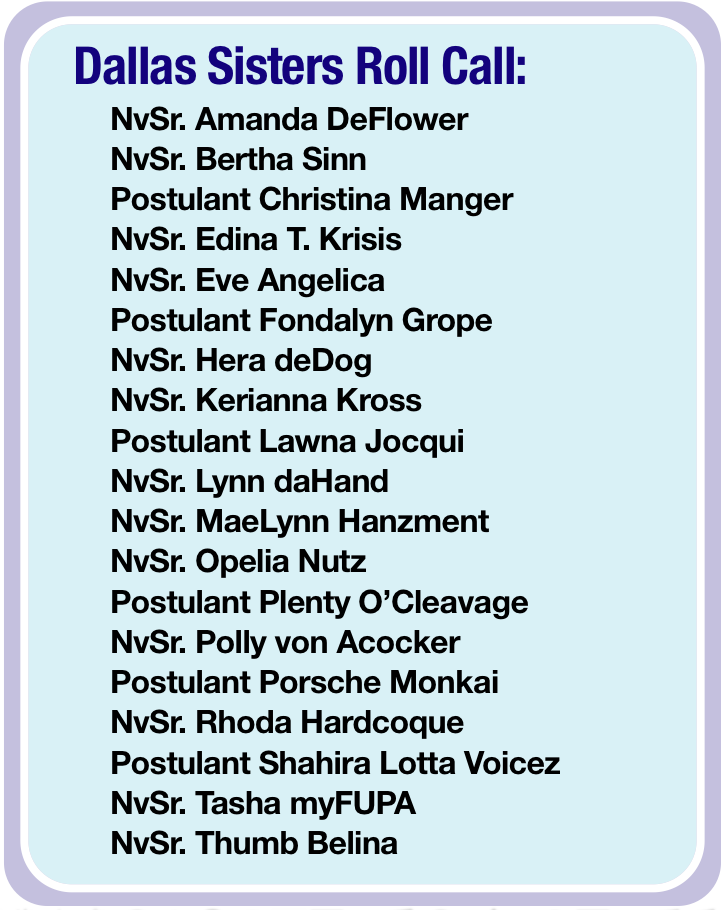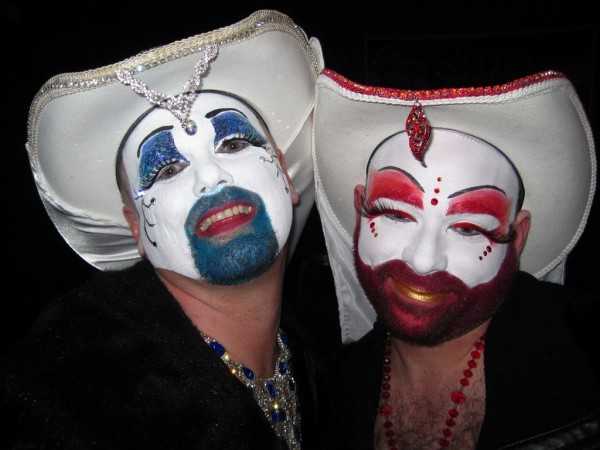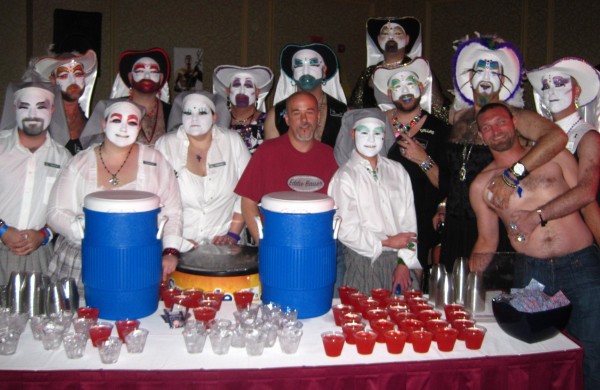DFW Sisters bring the outrageous fun and dedicated activism of the Sisters of Perpetual Indulgence to North Texas
RELATED ARTICLE: A BRIEF HISTORY OF THE SISTERHOOD
M. M. ADJARIAN | Contributing Writer
editor@dallasvoice.com
In their whiteface makeup, gaudy jewels, spangles and nun habits gone gloriously wild, the DFW Sisters are hard to miss — and equally hard to ignore. “[Our appearance] brings people to us,” says Novice Sister Tasha myFUPA. “The public wants to know: What’s this all about?”
A branch of the San Francisco-based Sisters of Perpetual Indulgence, the DFW Sisters have been doing fundraising, charity and service work in the DFW area for more than a year.
Originally founded as the Sisters of the Yellow Rose in February 2010, the DFW Sisters formed when the STYR regrouped the following September. In January, the main — or “mother” — SPI house in San Francisco recognized the Sisters as an SPI mission.
“We [now] have to do six fundraisers [to] prove ourselves to San Francisco and the United Nuns Privy Council,” Novice Sister Bertha Sinn explains. “Then we become a fully professed house.”
The United Nuns Privy Council is comprised of delegates from all missions and houses around the country. If all goes as planned, the Dallas Sisters will become the Dallas Sisters of Perpetual Indulgence in early 2012.
 The beginning
The beginning
The impetus to start a Sisterhood in the DFW area came from members who had contact with other SPI houses. Says Sister Eve Angelica, “We felt that Dallas was lacking an organization … that provides an outlet for us to be out there … sharing [our stories and] teaching people about safer sex and community safety.”
The Sisters of Perpetual Indulgence itself — now an international organization with 1,200 past and present members — came into existence in 1980. However, the three original founders had begun appearing (or manifesting, as the Sisters would say) in public the previous year.
Their first manifestation occurred on Easter Weekend 1979. The trio donned nun habits from an Iowa convent and went for a stroll through the Castro, home to San Francisco’s gay community.
The men were members of the Radical Faeries, an alternative gay male spirituality group. Part of their intent was to protest the too-slick “Castro Clones” image that they believed inhibited freer expressions of male homosexual identity. But, as Sister Bertha remarks, “[They also just wanted to] go out and have fun.”
Irreverent gender play was not new to either the SPI founders or the Castro District gay community. In fact, the Sisterhood was a direct heir to the legacy of two theater performance groups that emerged in San Francisco in the late 1960s: the Cockettes and the Angels of Light.
These groups became known for the way they would use high camp and drag to satirize all aspects of popular culture: no topic — including religion — was ever deemed too sacred to be mocked.
From the start, however, SPI playfulness was also imbued with a sense of activist purpose. Soon after the Sisters formed in 1980, they began campaigns to stop fundamentalist Christians from preaching anti-gay rhetoric in the Castro. And when the AIDS crisis began to take shape in the early 1980s, the Sisters responded by holding the first-ever AIDS fundraiser and writing a safer sex pamphlet that they distributed to the gay community.
Today’s mission
That sense of community responsibility abides 30 years later. Says Sister Bertha, “One of our main ministries, our bar ministry, is safe sex outreach. [We always have] our bliss kits [on hand], which [include] a condom, a little packet of lube and instructions on how to use it.”
Disseminating this kind of information has become an especially important part of the DFW Sisters’ work in the aftermath of cuts the Dallas City Council made in September 2009 to HIV/AIDS education programs.
The religion-inflected language the Sisters use in referring to themselves and their work belies the non-denominational nature of the Sisterhood.
“We’ve got people of all faiths. And no faiths. It runs the gamut,” Sister Bertha notes.
Diversity also defines the personal backgrounds of individual DFW sister members. The SPI began as a male-only organization; but now “[i]t doesn’t matter if you’re gay, straight, [male, female], blue, white, black [or] green,” says Sister Tasha. “[What does matter is that] you feel the calling.”
As would be the case in a regular religious order, commitment to the organization and its mission is paramount, as is a strong social and moral conscience. Novice Sister Edina T. Krisis’ decision to join the group arose after the devastating loss of her partner to AIDS. “Dallas was amazing to me,” she said. “I had to give back because [others] gave me back the rest of my life.”
At the same time, the commitment required to be a sister can, as Novice Sister Angelica remarks, “almost make [the whole enterprise] feel like a part-time job.” Moreover, sister-status is not for the faint-hearted. Only after one year of rising through three levels of membership — aspirant, postulant and novice — can an individual have the chance to become a fully professed Sister. After that, the person is a member for life.
Since the Dallas Sisters are an SPI mission rather than an SPI house, those designated as Sisters are still at novice level. Only after they are approved as an autonomous house will those who have been novices for at least six months be considered for elevation to full Sisterhood.
While the Dallas Sisters now work primarily in the Metroplex’s LGBT communities, with such groups as Resource Center Dallas and the Texas Gay Rodeo Association, long-term the Sisters see themselves as also working in the mainstream, too.
“So long as the mission [of a group] is in keeping with our mission and goals,” says Sister Bertha, “then [we’ll help anyone].”
For all their good works in the community, the Dallas Sisters have not been without their critics, not all of whom have been affiliated with conservative religious organizations.
Novice Sister Polly von Acocker recalls an incident when a gay man from Dallas posted pictures of the Sisters on his Facebook account along with derogatory comments about the Sisterhood itself.
“We ruffled his feathers,” Sister Polly recalls. “He didn’t like the way the Sisters portrayed the gay community.”
Undaunted, Sister Polly used this incident to educate this detractor about the SPI: “[After] opening up a dialogue with him, [the man] became one of my biggest supporters. I know now that if I need a donation, I can go straight to him.”
The ability to attract attention, stir up controversy and change minds is part of what Sister Tasha calls “the power of whiteface.” But behind the makeup are just ordinary — and in many cases, surprisingly shy — people just trying to make a difference in the community. Their Sister alter-egos, with the outsized personalities, are what make the group successful.
Having an organizational strategy that works also helps. The DFW Sisters run primarily on consensus, Sister Polly explains. Any voting that takes place is done to lend an official stamp to any agreements reached among group members.
Where the real challenge lies, says Sister Polly, “is in making sure everyone has a role in running the [group].”
The Sisters run their organization a bit like a family, but with Roberts Rules of Order in hand. Their “kinship” ties run much deeper, however: their shared vision has become a kind of “blood bond” that unites them beyond structure.
“We bicker like family,” says Sister Bertha. “But there’s a lot of love there, too.”
This article appeared in the Dallas Voice print edition April 1, 2011.















Great article! I love The Sisters!!!
Rock on Sisters! Love to all of you, keep up the great work you do in the Dallas area!!
I want to thank the Dallas Voice for this article. It is an absolute pleasure to see the Mission of the Sisters and the work that all Sisters of Perpetual Indulgence do around the world so well stated in print. I am overjoyed that the Mission in Dallas has been embraced by the communities in and around the DFW area. The Sisters I have enjoyed talking with in both Dallas and in Oaklahoma City, also a Missionary order, have their work cut out for them. It will be a pleasure to see them as Fully Professed Houses when their time has come. @}– Sister Ida
What an honor it is to witness the growth of such a wonderful group of individuals. Thank you to The Dallas Voice for showcasing the DFW Sisters and the incredible work they do for the community.
Love this article and it is about time they were seen as a partner to us who are working to end the spread of HIV, I hosted 3 of them at my No Tie Dinner saturday and everyone was in love with them. At the Dessert Party, they were quickly surrounded by people unaware of their mission, pictures were being taken and such. Thank you again for this uplifting article. Love to all of the DFW Sisters.
This is a great article that really shares the purpose for the Sisters!
Their activism is great yes, but get a few cocktails in them, and they can be one of the foulest, rudist bunch of people I’ve ever been around…if you want stereotypes, look no further.
congratulations sisters on a solid well written article for your first cover story, and keep up the good work. and gently prod some of our sisters to go a little lighter on those cocktails. a drunk nun is always noticed. It is an occupational hazard when your service is bar ministry connected.
I’m thrilled to see such a great organization finally come to DFW. I’ve been to many of the fundraisers they’ve been a part of, an it’s great seeing people willing to give back to their community. I love that they all come from differnet walks of life, including even straight members. Keep up the GREAT work!
i attended the event the Sisters held at a Garland skating rink last night and have to say it was a blast. Unfortunately it seems many people did not know about the event. Might someone contact the Sisters about doing it again would be appreciated. After all, it’s for a good cause.
This is a amazing article about the DFW Sisters. Such a great group of people that I welcome to our community Thank you Dallas Voice for this article and THANK YOU DFW Sister for doing what you do.
.